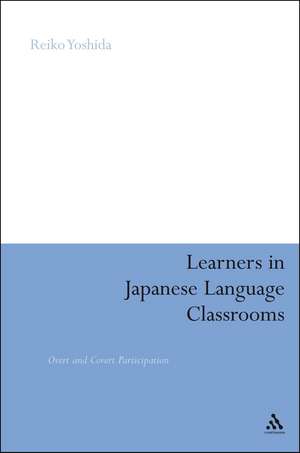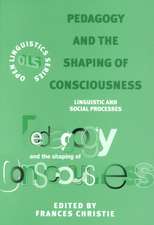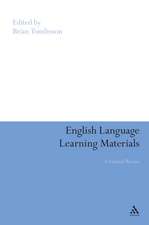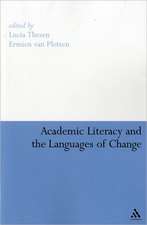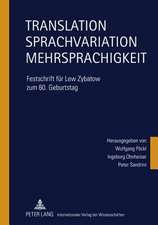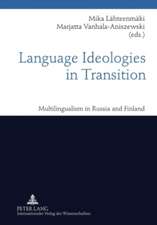Learners in Japanese Language Classrooms: Overt and Covert Participation
Autor Dr Reiko Yoshidaen Limba Engleză Paperback – 26 oct 2011
The verbal participation of learners in language classrooms offers a rich seam of data to the applied linguist. Overt and covert participation, when examined, can reveal both the structures of a classroom and elicit privileged information on participant's self-perceptions. It examines the verbal participation of learners in Japanese as a Foreign Language classrooms. Verbal interactions with teachers and classmates and 'private' speech acts are examined in relation to the classroom context and also sociocultural factors such as the learner's motivation and the teacher's belief in their own methods.
The examination of corrective feedback episodes and learners' private speech uses recorded speech and stimulated recall interviews recorded over the period of a year. The main focus is on Corrective Feedback episodes, and explains not only the language used in class but also teacher's and learner's own perceptions. It will be of interest to researchers in applied linguistics and second language acquisition, especially those involved with Japanese as a second or other language.
| Toate formatele și edițiile | Preț | Express |
|---|---|---|
| Paperback (1) | 257.68 lei 6-8 săpt. | |
| Bloomsbury Publishing – 26 oct 2011 | 257.68 lei 6-8 săpt. | |
| Hardback (1) | 1008.01 lei 6-8 săpt. | |
| Bloomsbury Publishing – 21 iun 2009 | 1008.01 lei 6-8 săpt. |
Preț: 257.68 lei
Preț vechi: 331.29 lei
-22% Nou
Puncte Express: 387
Preț estimativ în valută:
49.31€ • 52.73$ • 41.11£
49.31€ • 52.73$ • 41.11£
Carte tipărită la comandă
Livrare economică 17 aprilie-01 mai
Preluare comenzi: 021 569.72.76
Specificații
ISBN-13: 9781441196408
ISBN-10: 1441196404
Pagini: 264
Dimensiuni: 156 x 234 x 14 mm
Greutate: 0.37 kg
Editura: Bloomsbury Publishing
Colecția Continuum
Locul publicării:London, United Kingdom
ISBN-10: 1441196404
Pagini: 264
Dimensiuni: 156 x 234 x 14 mm
Greutate: 0.37 kg
Editura: Bloomsbury Publishing
Colecția Continuum
Locul publicării:London, United Kingdom
Caracteristici
Features quantitative and qualitative analysis of data in relation to classroom contexts: the backgrounds of teachers and learners and their motivations and beliefs.
Notă biografică
Dr Reiko Yoshida is at the School of Communication, International Studies and Languages, University of NSouth Australia, Australia
Cuprins
1. Overt and Covert speech in language classrooms
2. A review of corrective feedback and quantitative analysis
3. Corrective feedback: learners' and teachers' perceptions
4. A review of private speech and quantitative analysis
5. Private speech: learners' and teachers' perceptions
6. Re-interpreting learners' participation in JFL classrooms
References
Appendices
2. A review of corrective feedback and quantitative analysis
3. Corrective feedback: learners' and teachers' perceptions
4. A review of private speech and quantitative analysis
5. Private speech: learners' and teachers' perceptions
6. Re-interpreting learners' participation in JFL classrooms
References
Appendices
Index
Recenzii
"Reiko Yoshida's book starts from the assumption that language learners are active participants in the language classroom and that all of their language use, including language used privately, is relevant to their language learning. Much of the language use analysed in this book would normally not be available for a language teacher because it is by definition private and would therefore often be overlooked as an important part of learning. This book makes available what is often hidden and examines how such hidden language is not only relevant for but a constituent part of language learning. Yoshida's investigation of personal speech opens up second language acquisition research beyond a focus on the code to be learnt and places the learner on centre stage in language acquisition. Her study makes a valuable contribution to understanding language learning as a socioculturally constructed enterprise and reveals the importance of what students do with their whole language repertoire in the process of acquiring a new language."- Professor Tony Liddicoat, University of South Australia
